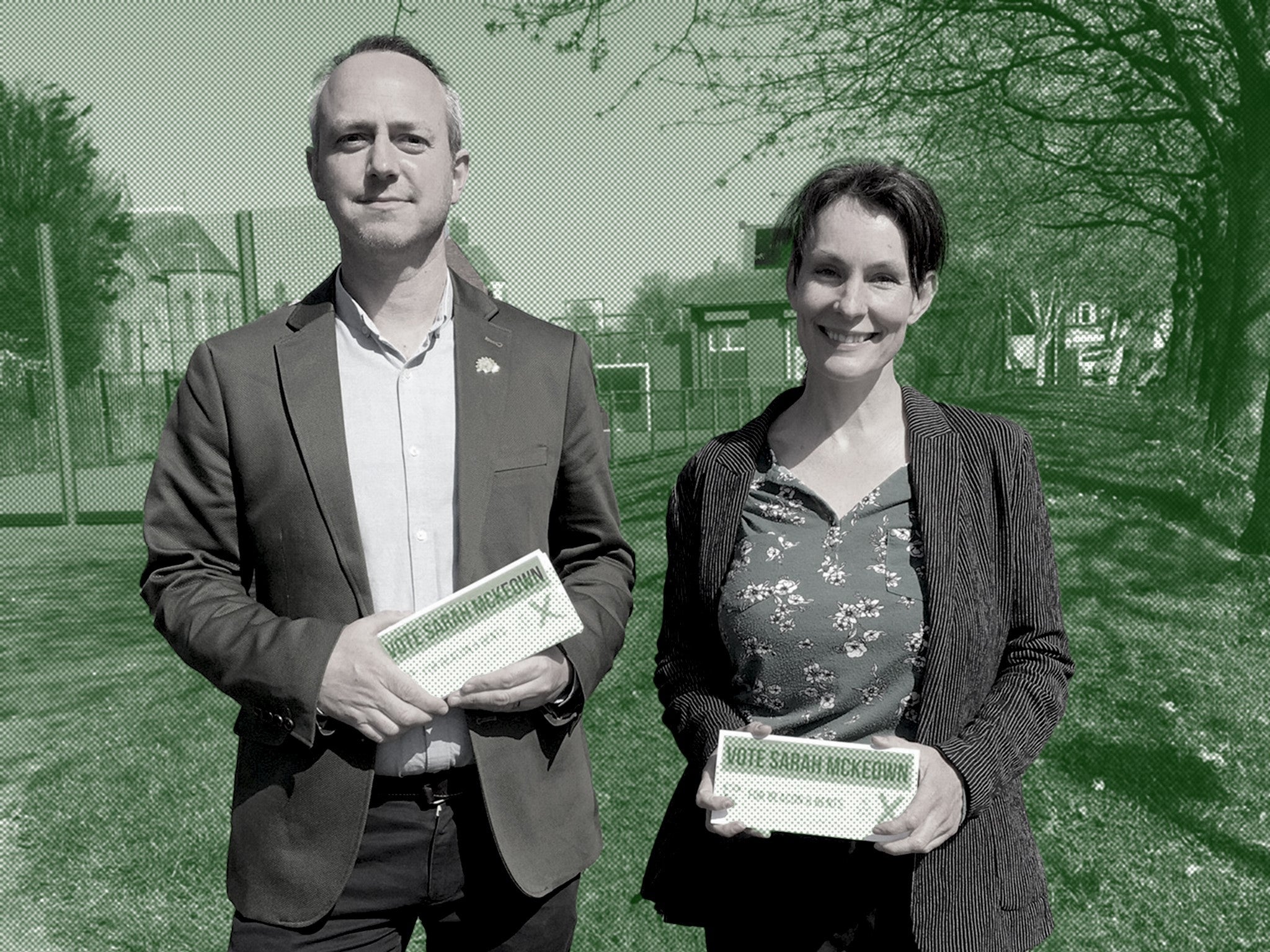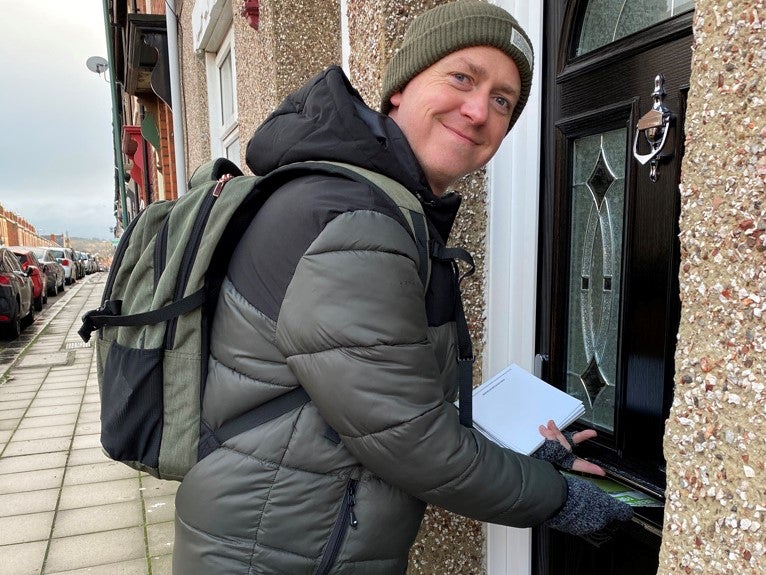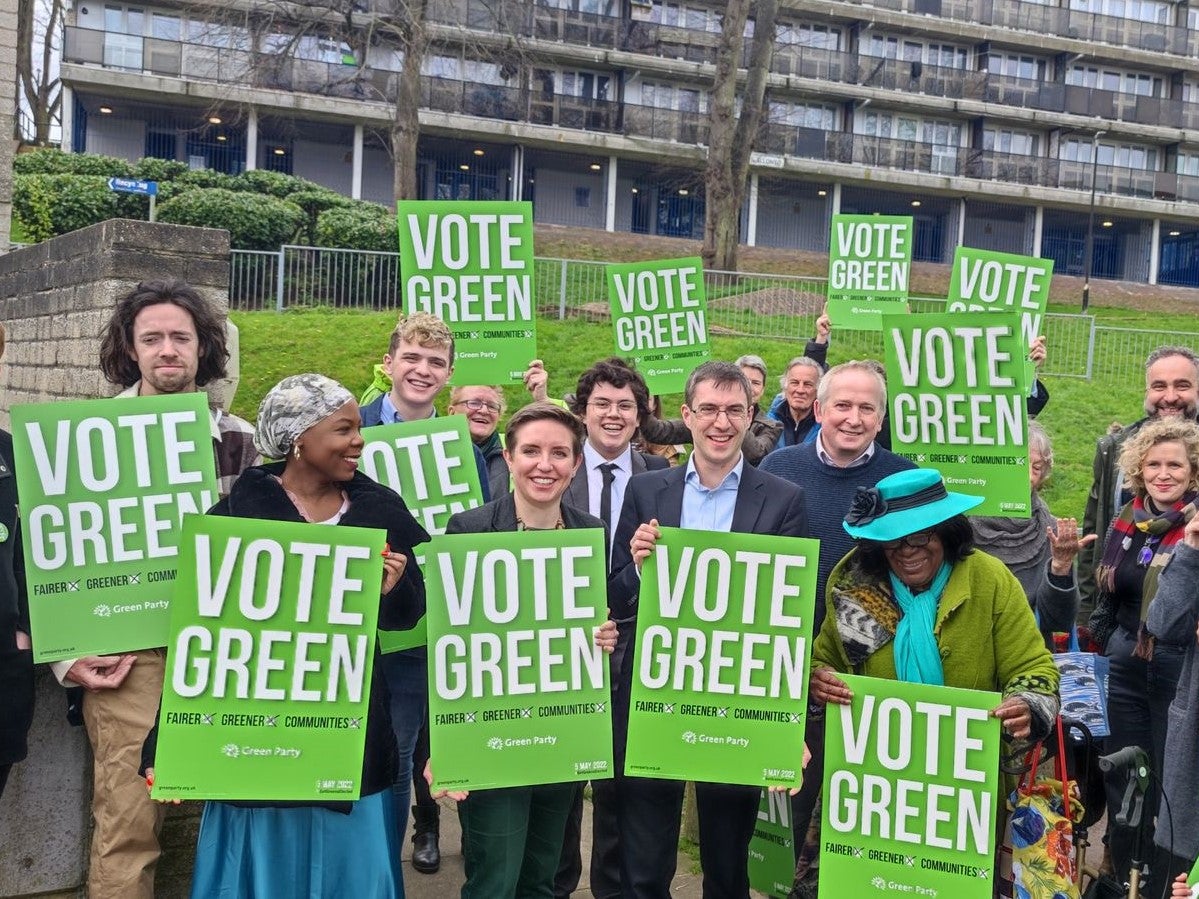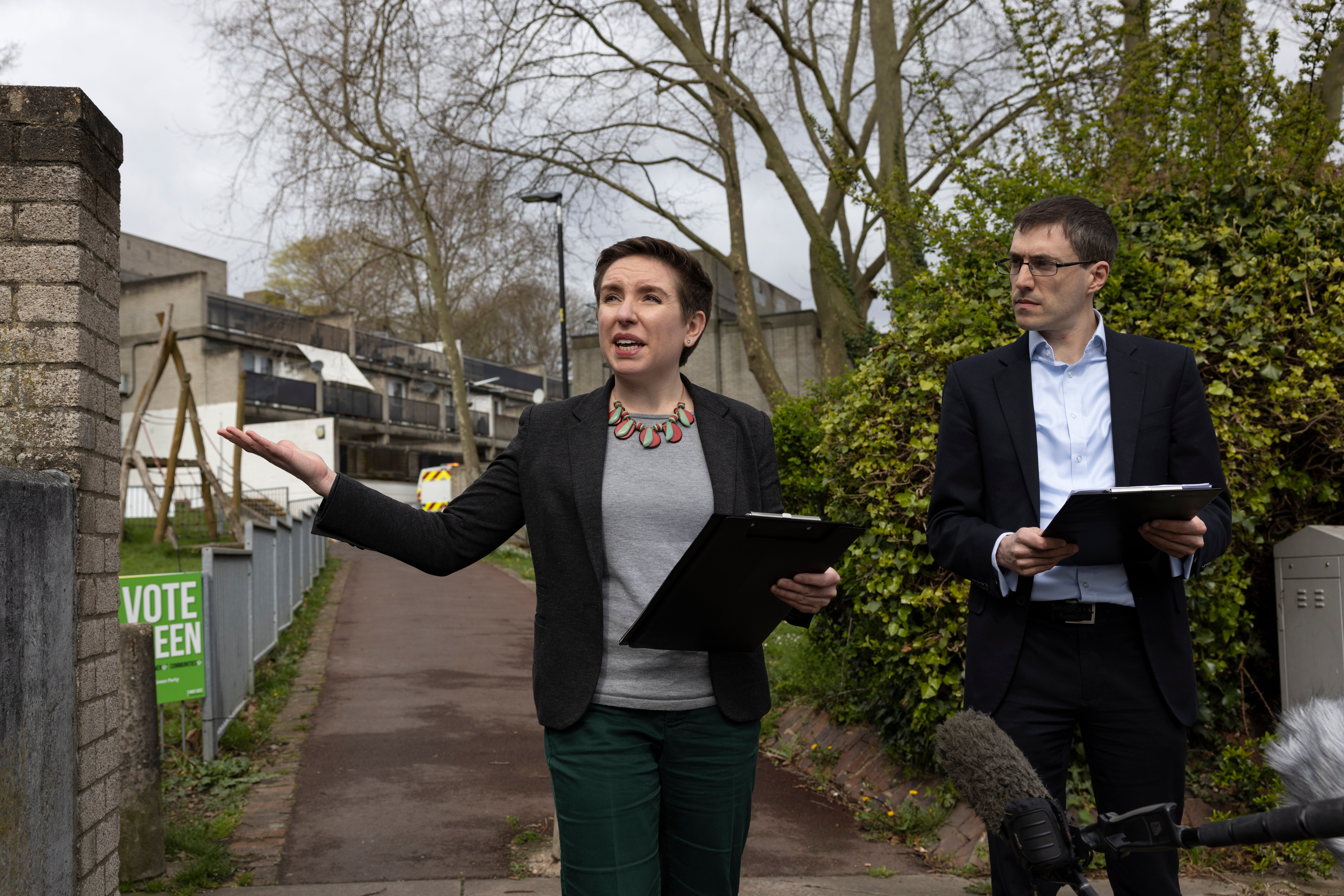Local elections 2022: Greens winning hearts in northeast as party eyes ‘tectonic shift’ among voters
Campaigners welcomed on doorstep in Labour stronghold South Shields as internal polls predict party will make large gains across the country

Your support helps us to tell the story
From reproductive rights to climate change to Big Tech, The Independent is on the ground when the story is developing. Whether it's investigating the financials of Elon Musk's pro-Trump PAC or producing our latest documentary, 'The A Word', which shines a light on the American women fighting for reproductive rights, we know how important it is to parse out the facts from the messaging.
At such a critical moment in US history, we need reporters on the ground. Your donation allows us to keep sending journalists to speak to both sides of the story.
The Independent is trusted by Americans across the entire political spectrum. And unlike many other quality news outlets, we choose not to lock Americans out of our reporting and analysis with paywalls. We believe quality journalism should be available to everyone, paid for by those who can afford it.
Your support makes all the difference.Standing on his doorstep in the former mining town of South Shields, Paul Ahmed, a retired firefighter and lifelong Labour voter, explained why he would be going green at this year’s local elections.
“They’re the only party you ever see round here,” he said. “Labour’s taken [this town] for granted for years, and I’d sooner kill mesen than vote Tory.”
He liked the Greens’ founding commitment to the environment. “The planet’s dying on its arse, man,” the 62-year-old declared. “They were saying that before anyone.”
His next door neighbour was of a similar mind. The party had made themselves part of the community, Margaret Roxby said – always there on litter picks or supporting local campaigns. She’d been voting for them for a couple of years now and the 64-year-old’s only regret was not doing so sooner. They were once dismissed as tree-huggers, she mused, “but, aye, I’ve nothing against tree hugging”.
The Greens are, by any measure, a party on the rise – both in the northeast and across the country.
In a series of remarkable election results last year, they won 155 English and Welsh council seats, helping take their total to a record high of 467. They now lead two authorities, in Brighton and Hove, and Lancaster, are in a ruling coalition in another 13, including Oxfordshire, York and Sheffield, and make up the official opposition in eight more including Bristol, Norwich and Solihull.
Now, it is all but certain this growth will continue on 5 May: a realistic good night would see them smash the 500-seat barrier, party bosses suggest. In particular, they are hoping to move beyond their traditional metropolitan powerbases and establish a greater presence in the north’s old industrial heartlands.
Burnley, Bradford and Trafford are among the once-unlikely places that already have at least one Green councillor and are being targeted for bigger breakthroughs. Barnsley, Sunderland and Chorley could all see their first Green elected if internal polling is to be believed.
“What they are looking to do is nothing less than force a tectonic shift in British politics,” says Matthew Flinders, professor in politics at the University of Sheffield. “There’s some way to go until we can say they are close to that but the speed of travel is impressive.”

Which brings us back South Shields – an old colliery and shipbuilding town that perhaps typifies the Green efforts to make northern inroads.
The local council, South Tyneside, has been Labour since its inception in 1974. Forty-five of its 54 councillors are currently red.
By contrast, when local Green leader David Francis joined the party here in 2014, it was so small that meetings were “four or five of us gathering in someone’s front room”.
Eight years on, he is one of three councillors. Now, the hope is for that number to be doubled on 5 May, turning the group into the official opposition. And, certainly, on the doorstep on a sunny Friday afternoon, such an aspiration appeared entirely plausible.
Resident after resident in the inner-town ward of Beacon and Bents opened their doors to say they would be voting for the party’s candidate Sarah McKeown.
“I’m down the club tonight,” noted one ex-miner. “They’re all saying they’re Green this year.”
Would he have a poster for his window in that case? “Aye, why not?”
A big one? A little one? “Give me both and I’ll see what the wife says.”
The hearty response is down to a variety of overlapping factors, according to Francis.

The increasing acceptance that the planet is, er, dying on its arse – that’s the climate crisis – has attracted plenty of voters in an area that will pretty quickly find itself under water if global temperatures continue rising.
But, perhaps of greater significance, is a tangible anger here at a sense of being taken for granted by the dominant Labour Party for too long. “They’re sitting tenants,” one resident fumed. “They reckon they’ve a job for life and that’s how they treat it.”
Francis has heard this sentiment often. “We get told they’d never seen a councillor round here except for election time until we got in,” he said. “One thing you can guarantee with us is we won’t be taking your vote for granted.”
A back-to-basics approach has won much support. Knocking on doors, asking about issues and trying to resolve problems. Fly-tipping, anti-social behaviour, noise pollution and obstructive parking are all things he spends considerable time on. “These aren’t glamorous things,” the 43-year-old said. “But they are what matter to people.”
His own proudest achievements since being elected in 2019 have been putting forward a climate emergency motion which the council subsequently adopted and helping restore an axed bus route widely used by older residents. He is currently leading a popular campaign to prevent Nexus – the Tyne and Wear transport authority – from chopping down a number of trees along the town’s Metro route.
“People living there love these trees,” he said. “It’s the same as happens so often: they feel this thing is being done to them rather than with or for them.”

While local groups focus on such grassroots concerns, success has probably also come, insiders say, as a direct result of the national party spending years professionalising itself.
“I sometimes say the Green Party was set up by very well-meaning people who could see a vision for a better world and they knew they had it right,” said Birmingham-based Chris Williams, the party’s head of elections. “But they didn’t always know how to explain that vision or how to make it relevant to people’s lives. So, over the last few years, this is something we’ve really focused on. We’ve taught ourselves how to engage voters and organise effective campaigns. Even something as basic as getting leaflets right. We’ve taught ourselves how to win elections, really.”
Initiatives such as centralised training programmes for wannabe councillors and a future leaders scheme have improved the party’s operations, while a broading policy base – covering everything from insulation to public transport – has allowed it to swipe voters from both Labour and the Conservatives: half of its nationwide target seats this year are currently held by Tories.
“There is disillusionment on both the left and right because of things like [Partygate and the cost of living crisis],” said Williams. “And voters see that we’re different. There are no career politicians here. If you vote Green you are voting for someone who is involved because they genuinely wants to make the world a better place.”

There are, of course, considerable caveats to all this.
Even if the party does reach that target figure of 500 council seats on Thursday, that is still a tiny proportion of the country’s 20,000 overall seats. In South Shields, a good election would see them still only have a ninth of all councillors here. Pointedly, of all those residents here who say they will be voting for the party this year, almost none say they would do the same in a general election. “Probably Labour,” said the aforementioned Frank Ahmed. “Anything to try and get the Tories out.”
Success may also beget internal divisions. There is a wing of this party that undoubtedly feels its professionalisation – and willingness to compromise within coalitions – has moved it away from its radical roots.
Nonetheless, what is happening across the rest of Europe offers hope that the party’s growth will only continue. In seven countries on the continent – Austria, Belgium, Finland, Germany, Ireland, Luxembourg and Sweden – Greens share power in coalition governments.
“There’s no reason we can’t have that here as well,” said McKeown, the candidate in the Beacon and Bents ward and, a teacher by profession. “Young people want something different to the old status quo. I see this in my job. They see the Greens as the future.”
On a sunny day in South Shields, such hope feels well placed.




Join our commenting forum
Join thought-provoking conversations, follow other Independent readers and see their replies
Comments